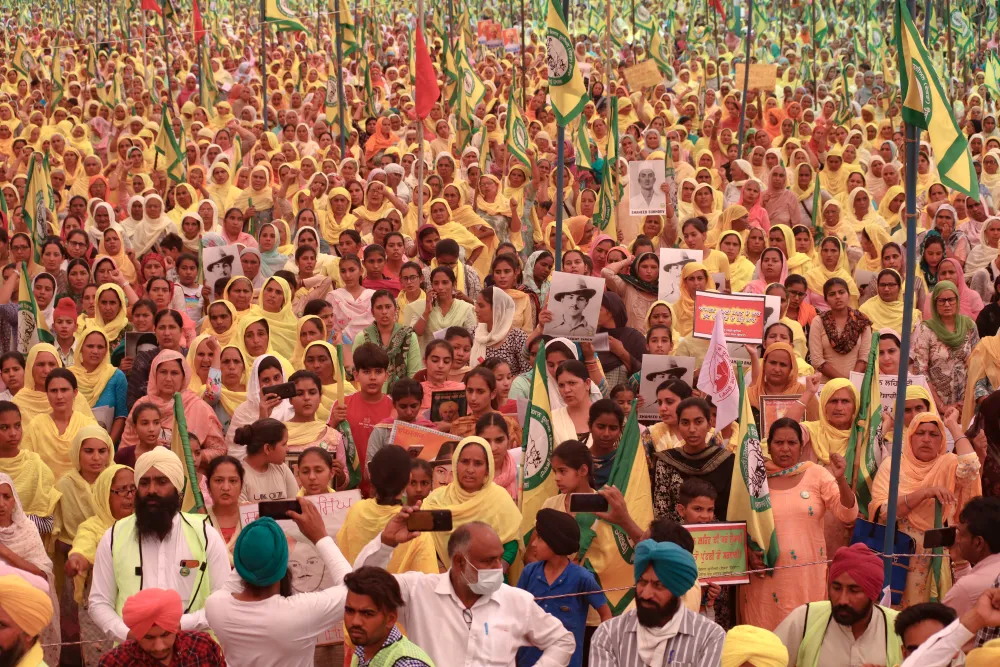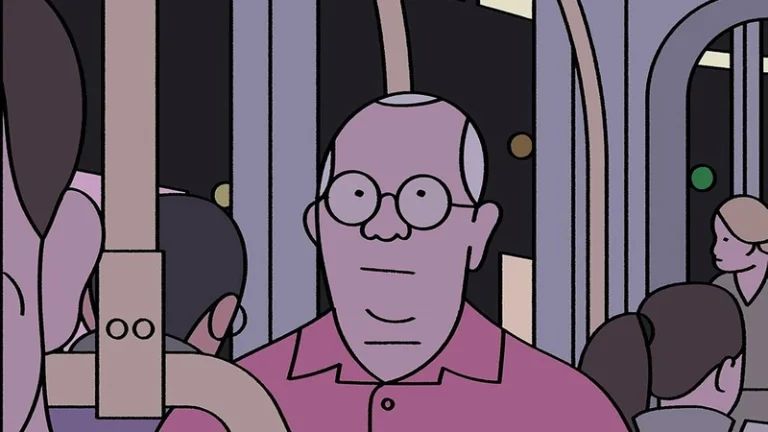There is only a handful of films that truly feel attuned to the particular sensibility and politics it is geared to. Chronicling the farmers’ movement that rippled from Punjab to Delhi between 2020 and 2021, Nishtha Jain’s “Farming the Revolution” reverberates with passion and polemics, shot through a dignified vein. Throughout the agitation, spread over thirteen months, we witness the barrage of vicious, vitriolic narratives spun by mainstream media/Godi media (lapdog media) and regularly hosed into the making of public opinion.
The film immerses us in the heart of the protest. As we are guided through the camps set up on the roadside, intimate, incredibly inspiring snapshots of sheer persistence and dogged will emerge. Many of the protestors are elderly or senior citizens. Their spirit, however, is unshakable. They are acutely aware there’s no choice but to retaliate against laws that seek to hand over the sale of grain to private players if future generations are to be saved. So they stay undeterred through both chilly cold and blistering heat.
Jain stresses with elegant sobriety and keenly specific patience how the farmers are waging a battle on several fronts. It is not just to reinstate their land rights but also to push back against fabricated perceptions of their protest. More than getting a space to air their grievances, they are routinely battered with maligning. There are no gestures of solidarity, only slander hurled by big media houses keeling over to corporatized, government-friendly interests. They are branded as militants and terrorists. To counter this, they distribute a local newsletter, Trolley Times. But how much can such small, alternative, and limited dissemination penetrate into the maelstrom of public consciousness?
This is only one of the many cues the film offers in directing our attention at a larger socio-political landscape fractured by the most damaging falsehoods being shamelessly trumpeted, strategic efforts to tear down non-violent protest, and independent, critical platforms rapidly drying up. Damning, devastating indicators are strewn throughout. Ultimately, the farmers may concede they cannot control how they’d like to be perceived and how their struggle is to be represented; what’s non-negotiable is a guarantee of their rights, including ensuring the minimum support price for crops. It is not just their livelihood, but their existence stands to be threatened by the unconstitutionally passed laws. Jain summons the astonishing breadth of intelligence, clear-eyed argumentation, and profound wisdom the people have.
Above all, “Farming the Revolution” is a paean to the unflinching resolve and formidable strength that is vested within a people-led movement. They may not have many privileges, but when they join ranks, they possess enough might to make the most powerful halt in their tracks. There’s not even a wave of acknowledgment from the government until the eighth month. Naturally, the movement is so rich in its combination of dynamism and exasperating seeming lack of progress that it could have sustained an entire series. Within the inertness, the people mine everyday courage and grit to keep going even if there seem no distant flickers of hope and resolution.

It is a thing of marvel to absorb and ponder how Jain and co-director Akash Basumatari have cleaved through presumably a mountain of footage and presented an incisive, inviting, and respectfully intelligent study of resilience that challenges every dominant model of oppressive thought until it is compelled to listen. Basumatari’s (also the DoP) camera frequently registers in an array of top and wide shots the sheer, escalating enormity and scale of the numbers. As dour the situation inherently is, it’s also thrilling and rousing to watch the demonstrations gaining momentum at close quarters. There are pockets of hope in the groundswell of support it gathers, the locals showing up in different capacities of generosity to make their solidarity deeply felt.
Jain casts her sharp gaze wide and deep into the movement’s many, varied, intertwining intricacies even as she focalizes the farmers’ reiterative emphasis on what they are fighting for. It may seem like a set of clarifications, but as we are drawn into the film’s tide, they emerge as vital, alarming reminders of the sweeping implications if the laws aren’t struck down as soon as possible. Importantly, the film is as much about the tenacity of their civil disobedience situated in the contemporary movement as it acknowledges both the history and future swirling around. The stakes are far higher than just getting the brakes pulled on the three laws. Union leaders flag urgent, pervasive questions of how they can make farming profitable. The agrarian crisis is bigger. How can farmers break the cycle of debt?
Albeit “Farming the Revolution” doesn’t wade into the resumption of the protests in February 2024 beyond a forbidding closing mention, following the unfulfillment of all the promises, Jain has peppered it with sufficient layers that suggest the indomitable, enduring potential of the working class to keep defying the harshest circumstances. Her film is also indelibly moving in how it evokes an abiding, genuine sense of community.
Reality is abundantly grim, but the people know how to snatch laughter and steal a moment of good cheer from the jaws of the constantly hovering pathos. The film puts special emphasis on the role of women, arguing for them as being equally integral to the movement, if not more so, in how they bring greater credibility into it. One of the women talks about an emotional bond of siblinghood with the men and shares with amusement a deal of getting a quilt in exchange for providing extra rotis. It is critical to note Jain’s astute probing into why women joined the protests in large numbers.
Jain depicts with care and grace the farmers’ and their kin propping themselves up against being jaded or defeated. They can’t afford to submit to resignation even as they weather extreme precarity. Their vulnerability is heightened at systemic and private levels. Jain’s attention to the people is immaculately minute and unerringly faithful. “Farming The Revolution” isn’t merely a bold, vigorous, rousing testimony of protest; it is a monument to asserting and exercising every democratic, disobedient fiber of our being to rescue a world from crashing.



![Holy Motors [2012]: The Death & Re-birth of Cinema](https://79468c92.delivery.rocketcdn.me/wp-content/uploads/2017/06/holy_motors_2-768x432.jpg)
![Dragged Across Concrete Review [2019]- Taste the Pavement](https://79468c92.delivery.rocketcdn.me/wp-content/uploads/2019/04/DAC_D27_04417-768x502.jpg)
![Taming the Garden [2021] ‘MUBI’ Review: An Anger-inducing Synecdoche for Human evolution](https://79468c92.delivery.rocketcdn.me/wp-content/uploads/2022/01/Taming-the-Garden-2021-768x432.jpeg)

![Endless Poetry [2016]: JIO MAMI Mumbai Film Festival Review](https://79468c92.delivery.rocketcdn.me/wp-content/uploads/2016/11/Endless-Poetry-768x576.jpg)